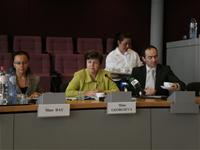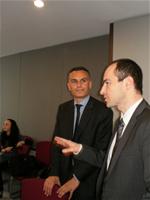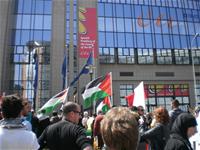The tunnel economy in the occupied territories is more dangerous to Israel
Ralitsa Kovacheva, June 4, 2010
 The concentration of international attention on the incident with Israeli Defence Forces' storming of a humanitarian convoy, should be used to open the doors to the Palestinian territories. This is what the European Commissioner on Humanitarian Aid Christalina Gheorghieva said during a meeting with Bulgarian journalists in Brussels. The European Union should enhance its political role in the Middle East in the context of the development of a common foreign policy, Members of the European Parliament commented. This had become especially pending after the incident with the convoy on May 31.
The concentration of international attention on the incident with Israeli Defence Forces' storming of a humanitarian convoy, should be used to open the doors to the Palestinian territories. This is what the European Commissioner on Humanitarian Aid Christalina Gheorghieva said during a meeting with Bulgarian journalists in Brussels. The European Union should enhance its political role in the Middle East in the context of the development of a common foreign policy, Members of the European Parliament commented. This had become especially pending after the incident with the convoy on May 31.
Christalina Gheorghieva reminded that she had asked Israel to provide the EU with a list of products that were allowed for import in the occupied territories as well as a list with goods, considered to be posing risks for security. The EU has a 52 mn euro budget for aid for the occupied territories for this year. The aid is part of the Union's commitments within the framework of the UN Security Council decisions and as part of the peace negotiations in the Middle East of the international quartet (the US, Russia, the EU and the UN).
Ms Gheorghieva clarified that the attacked convoy was neither organised by the  EU nor the Union had any participation in it. She added that it was impossible banned goods to be imported together with European aid. This, the Commissioner said, can be realised through the tunnel economy.
EU nor the Union had any participation in it. She added that it was impossible banned goods to be imported together with European aid. This, the Commissioner said, can be realised through the tunnel economy.
"I can tell you very responsibly that the measures we have undertaken, indeed do protect humanitarian aid deliveries from doubts that they can be used for terror goals and what we want is to be allowed to realise our obligations. No more, no less. And, by the way, when I spoke to Israel's Deputy Prime Minister Silvan Shalom he said that Israel did understand our obligations and that the country was ready to help us do our job. However, this has still not been materialized, for example by the provision of a list of banned and allowed goods. This is a very simple issue - what we can and what we cannot. We want to see it", Commissioner Gheorghieva stressed.
 The moods in Brussels to the incident were cautious and contained but there was criticism as well. Before the Bulgarian journalists Arnaud Danjean (chairman of the Defence and Security Subcommittee in the European Parliament) said that Israel took non-proportional actions and a great risk but, still, the results of the inquiry should be awaited in order to see whether there had been a provocation. The more important question however is that there is no perspective for the situation in the Middle East because bilateral negotiations have been renewed but the progress is insignificant and colonization is still going on, which is unacceptable for the EU. Not a less serious issue is the tension within the Palestinian territories - between Hamas and the Palestinian authorities.
The moods in Brussels to the incident were cautious and contained but there was criticism as well. Before the Bulgarian journalists Arnaud Danjean (chairman of the Defence and Security Subcommittee in the European Parliament) said that Israel took non-proportional actions and a great risk but, still, the results of the inquiry should be awaited in order to see whether there had been a provocation. The more important question however is that there is no perspective for the situation in the Middle East because bilateral negotiations have been renewed but the progress is insignificant and colonization is still going on, which is unacceptable for the EU. Not a less serious issue is the tension within the Palestinian territories - between Hamas and the Palestinian authorities.
The MEP from the European People's Party Andrey Kovachev put the incident in the context of EU's inability to enhance its presence and influence in the region. Responding to a question of euinside whether the incident was a good reason the EU (as being the largest net donor of aid in the region) to find a way to increase its political influence he said that the EU was often compared to an economic giant but was in fact a political dwarf.
"We still do not have a single policy, currently we are quarreling about the diplomatic service - and do you know why? For the simple reason that foreign policy and defence are the most conservative areas of a state's sovereignty. And no Member  State would like to give up this national sovereignty to some institution. The EU is a Union of sovereign states which want to speak with a strong voice to the world - this is a stated wish. This is what is written in the Lisbon Treaty".
State would like to give up this national sovereignty to some institution. The EU is a Union of sovereign states which want to speak with a strong voice to the world - this is a stated wish. This is what is written in the Lisbon Treaty".
Mr Kovachev also criticised the continued blockade of Gaza by adding that if it would continue this would doom the region to terrorism.
In the meantime on Tuesday there was a protest against Israel in Brussels as well in other European cities.